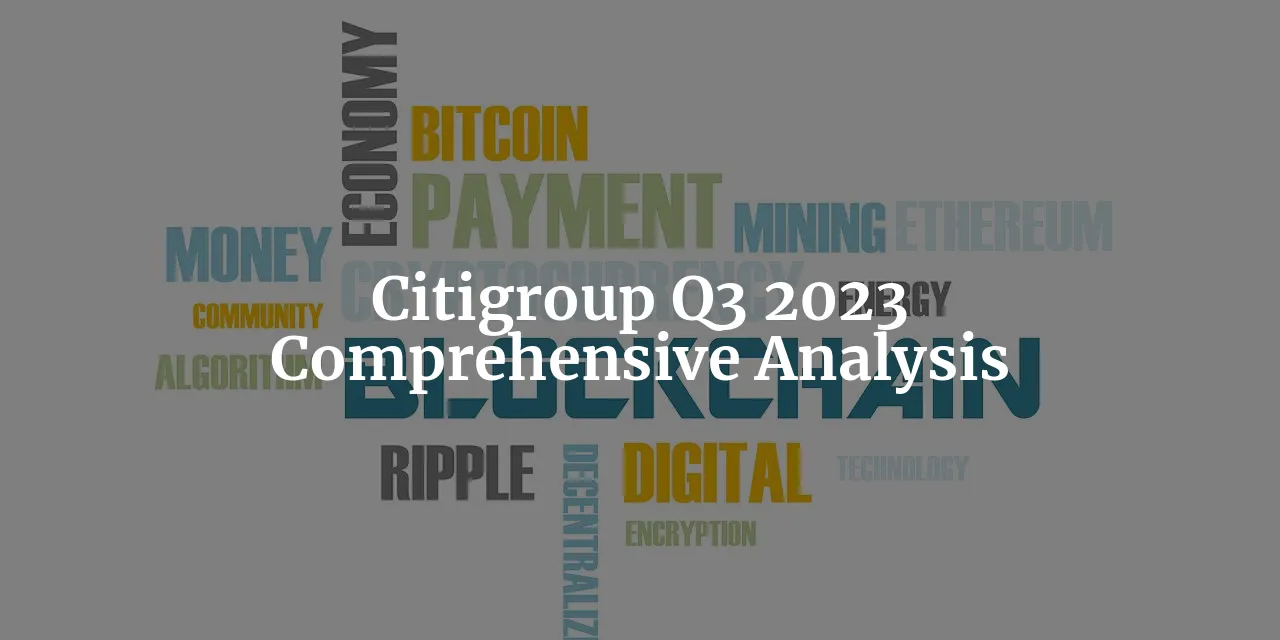Tags: Citigroup / Earnings
This fanpage is not officially affiliated with Berkshire Hathaway: Disclaimer
Attention, shareholders of Berkshire Hathaway! Are you curious about the current state of Citigroup and how it could impact Berkshire's investment? Dive into this comprehensive analysis of Citigroup's Q3 2023 performance and beyond. Discover the bank's financial health, market position, strategic restructuring, and social impact initiatives. Uncover the risks and opportunities that lie ahead for investors. Don't miss out on this insightful and essential read!

Introduction
Citigroup Inc., an American multinational investment bank and financial services corporation, has long been a staple in the global financial landscape. Formed through the historic merger of Citicorp and Travelers Group in 1998, it has grown to become the third-largest banking institution in the United States and a key player recognized by the Financial Stability Board as a systemically important financial institution 5. Among its prominent investors is none other than Warren Buffett's Berkshire Hathaway, holding a significant position in Citigroup with an investment worth $2.49 billion, representing 0.74% of their equity portfolio and owning 2.91% of the outstanding Citigroup stock 1 ↗. This investment, however, has not been without its challenges, as indicated by a 27% loss from the estimated purchase price of $3.41 billion 1.
In this comprehensive analysis, we will delve into the current state of Citigroup, examining its financial performance in Q3 2023, market position, and the strategic restructuring underway. We will also explore the bank's social impact initiatives and how these efforts align with global economic inclusion goals. The implications of Citigroup's recent activities and their potential impact on shareholders, particularly those of Berkshire Hathaway, will be a focal point of our discussion.
As shareholders of Berkshire Hathaway, understanding the intricacies of Citigroup's operations, challenges, and future outlook is crucial, given the substantial investment at stake. This article aims to provide a detailed view of Citigroup's Q3 2023 performance and beyond, offering insights into the risks and opportunities that lie ahead for investors ↗ .
Citigroup's Financial Performance in Q3 2023
Citigroup reported a net income of $3.5 billion for Q3 2023, or $1.63 per diluted share, on revenues of $20.1 billion. This represents a 9% increase in revenues from the prior-year period, with notable strength across the Services and Markets in the Institutional Clients Group (ICG) and US Personal Banking within Personal Banking and Wealth Management (PBWM) 3. Despite the positive revenue growth, Citigroup's financial health is not without its concerns. The cost of credit rose to approximately $1.8 billion in Q3 2023, compared to $1.4 billion in the prior-year period, and the total allowance for credit losses on loans stood at approximately $17.6 billion at quarter end 3.
The bank's end-of-period loans increased by 3% to $666 billion, while end-of-period deposits decreased by 3% to approximately $1.3 trillion 3. These figures suggest a mixed financial landscape, with growth in some areas being offset by declines in others. The revenue growth in different segments is particularly telling: ICG revenues surged by 12%, PBWM revenues grew by 10%, while Legacy Franchises revenues decreased by 13% 3. This indicates a shift in Citigroup's business focus, with stronger performance in its core segments.
Citigroup's Market Position and Challenges
Citigroup's market position is a reflection of its financial health and strategic decisions. As of the latest data, the bank's market cap stands at $86.163 billion, with a price-to-earnings (PE) ratio of 7.15 and earnings per share (EPS) of $6.30 2. These metrics are essential indicators of the bank's valuation and profitability in the eyes of investors. The 52-week stock price range of $38.17 - $53.23 suggests volatility and investor uncertainty, which could be attributed to various internal and external factors 2.
One of the challenges Citigroup faces is the divestiture-related impacts, as evidenced by the $299 million in earnings before taxes, primarily driven by a gain on the sale of the Taiwan consumer business 3. The decrease in end-of-period deposits also poses a concern, potentially indicating a shift in customer behavior or competitive pressures. These challenges are compounded by the broader economic environment, where interest rates, regulatory changes, and global market dynamics play significant roles.
Impact of Citigroup's Restructuring and Job Cuts
Citigroup is undergoing its most significant restructuring in two decades, slashing 300 senior management roles, equating to around 10% of its workforce at that level 6. CEO Jane Fraser's strategy aims to streamline operations and accelerate decision-making within the bank. These job cuts are part of a broader trend of layoffs across various sectors as the labor market begins to cool down. Despite these layoffs, Citigroup's headcount has remained stable at 240,000 for the past four quarters, thanks to the addition of technology employees and other strategic hires prior to the restructuring 6.
The bank's focus on five key areas—trading, banking, services, wealth management, and US consumer offerings—signals a strategic shift that could redefine its market position. Citigroup incurred around $650 million in severance charges after cutting 7,000 positions in the first nine months of the year, indicating the financial impact of these changes 6. The state of the labor market, with unemployment rates inching up to 3.9% and weekly claims for unemployment benefits rising to 240,000, provides a backdrop to these corporate maneuvers 6.
Warren Buffett's Position in Citigroup
Warren Buffett's Berkshire Hathaway has a notable stake in Citigroup, with the investment currently valued at $2.49 billion, down from an estimated purchase price of $3.41 billion, reflecting a 27% loss 1. This position accounts for 0.74% of Berkshire's equity portfolio and gives Buffett ownership of 2.91% of the outstanding Citigroup stock 1. In Q1 2023, Buffett increased his shares by 89 thousand, demonstrating a continued belief in the bank's value proposition despite the current loss 1.
The average closing price of Citigroup in Q1 2023 was $49.07, with a range of $43.11 - $52.35 1. This investment decision, like all of Buffett's moves, is closely watched by the investment community as a signal of confidence or concern. The recent share transactions indicate a nuanced approach to managing this significant holding in a challenging financial landscape.
Here's an overview of the data as provided by stockcircle.com 1:
| Metric | Q1 2023 | Q1 2022 |
|---|---|---|
| Avg Closing Price | $49.07 | $61.77 |
| Price Range | $43.11 - $52.35 | $53.40 - $67.84 |
| Citigroup shares bought by Berkshire | +89 Thousand | +55.2 Million (new investment) |
Citigroup's Social Impact and Philanthropic Initiatives
Citigroup's commitment to social impact and philanthropy is evident in its efforts to promote financial inclusion and sustainable development. With 1.7 billion adults worldwide lacking access to financial services and billions more without adequate sanitation or drinking water, the need for inclusive development is critical 4. The UN estimates that achieving the Sustainable Development Goals will require annual investments exceeding US$5 trillion, with philanthropy, the public sector, and private capital each playing vital roles 4.
The Citi Foundation has been at the forefront of financial inclusion initiatives, and the formation of Citi Social Finance as a specialist business unit underscores the bank's dedication to this cause. In 2022, Citi Social Finance contributed to the mobilization of around US$3 billion to finance clients seeking high social impact, with a goal to reach 15 million low-income households by 2025, including 10 million women 4. These initiatives, supported by technological advances and the digital revolution, enable the development of inclusive business models and highlight the importance of collaboration between stakeholders for a more equitable world 4.
Citigroup's Future Outlook and Strategic Direction
Looking ahead, Citigroup's strategic direction is focused on consolidating its core business areas and exiting most of its international operations 5. This pivot reflects a broader trend in the banking industry towards specialization and the pursuit of competitive advantages in key market segments. The bank's technological advancements and digital capabilities are expected to play a pivotal role in shaping its future, enabling it to adapt to changing consumer behaviors and market conditions.
The bank's exit from international operations will likely have a significant impact on its global footprint and strategic focus. This move could free up resources and allow Citigroup to concentrate on its strengths, potentially leading to improved financial performance and shareholder value over the long term. The bank's strategic focus areas—trading, banking, services, wealth management, and US consumer offerings—will likely define its path forward and determine its success in a rapidly evolving financial landscape 6.
Conclusion: What Does It Mean for Shareholders of Berkshire Hathaway?
For shareholders of Berkshire Hathaway, the current state of Citigroup presents both risks and opportunities. The bank's Q3 2023 performance shows signs of resilience, with revenue growth in key segments and a strong capital position ↗. However, the loss on Berkshire's investment, the restructuring efforts, and the broader economic challenges cannot be overlooked.
The risks for Berkshire shareholders lie in the potential for further market volatility, competitive pressures, and the uncertain outcomes of Citigroup's strategic shifts. Conversely, the opportunities may arise from the bank's focus on high-growth areas, its commitment to social impact, and the potential for improved efficiency and profitability post-restructuring.
In light of the analysis of Citigroup's Q3 2023 performance and future outlook, shareholders of Berkshire Hathaway should consider the bank's strategic direction, market position, and the broader economic environment when evaluating their investment. While the red alert may not be sounding just yet, a cautious and informed approach will be essential for navigating the uncertainties ahead.
References
-
Warren Buffett: 2 Citigroup transactions (Berkshire Hathaway / C) - stockcircle.com ↩↩↩↩↩↩↩
-
Citigroup Inc ↗. (C) Stock Price, News, Quote & History - Yahoo Finance - finance.yahoo.com ↩↩
-
Third Quarter 2023 Results and Key Metrics - www.citigroup.com ↩↩↩↩↩
-
Building Bridges toward Economic Inclusion - www.citigroup.com ↩↩↩↩
-
Citigroup - Wikipedia - en.wikipedia.org ↩↩
-
Citigroup lays off 300 jobs as America's red-hot labor market cools - www.dailymail.co.uk ↩↩↩↩↩










